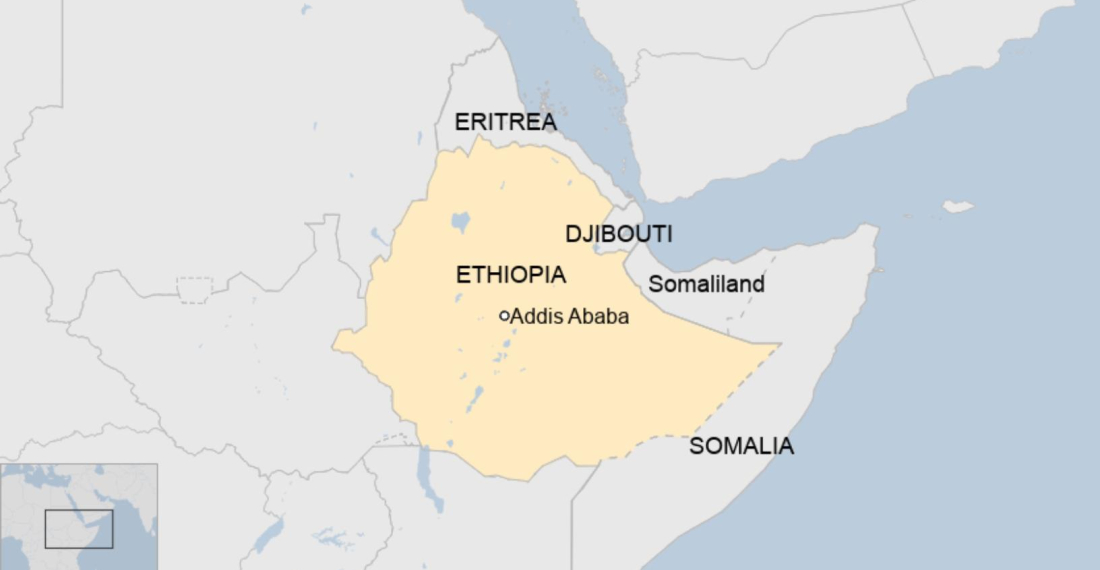Tension is high in the Horn of Africa after the self-declared state of Somaliland made a deal with Ethiopia granting it sea access. Ethiopia has been a landlocked country since granting independence to Eritrea in the 1990s following a prolonged struggle.
Somalia has described the agreement as an act of "aggression". Somaliland seceded from Somalia more than 30 years ago, but is not recognised internationally.
It said that Ethiopia agreed to recognise its independence at some point in the future in exchange for military access to the coast.
Ethiopia has not confirmed this aspect of Monday's contentious deal.
The office of Ethiopian prime minister Abiy Ahmed confirmed the country had signed a memorandum of understanding (MoU) "to secure access to the sea and diversify its access to seaports". Mr Abiy had previously described sea access as an "existential issue" for his country.
His national security adviser, Redwan Hussein, said the arrangement could enable Ethiopia to access a "leased military base" on the Red Sea, but gave no further details.
An MoU is regarded as a statement of intent and can lead to a legally binding treaty.
The development is being portrayed by both sides as a major diplomatic step.
Somalia, however, has reacted angrily to the MoU as it sees Somaliland as part of its territory.
It said it was recalling its ambassador to Ethiopia.
The government said the agreement was "null and void" and a violation of its sovereignty.
In a statement it added that it "considers this action as an aggression and... is an impediment to the good neighbourliness, peace and stability of the region which [is] already struggling with many challenges".
Somalia's Prime Minister Hamza Abdi Bare urged people to remain calm.
"I want to assure them that we are committed to the defence of the country. A part of our land, our sea and our air cannot be violated and I will defend it in every legal way," he said at a hastily arranged press conference.
The Reuters news agency reports that addressing parliament later on Tuesday, President Hassan Sheikh Mohamud said that "no-one has the power give away a piece of Somalia".
"Somaliland, you are the northern regions of Somalia. Ethiopia has no recognition for you," he added.
Somalia also said it wanted the UN Security Council and the African Union to discuss the issue.
The exact details of Monday's agreement that was signed by Prime Minister Abiy and Somaliland's President Muse Bihi Abdi in the Ethiopian capital, Addis Ababa, are not known.
Mr Abdi said the agreement included a section stating that Ethiopia would at some point in the future recognise Somaliland as an independent country.
The self-styled foreign ministry of Somaliland said in a statement that the "agreement ensures Ethiopia's access to the sea for their naval forces, reciprocated by formal recognition of the Republic of Somaliland, marking this as a significant diplomatic milestone for our country".
It quoted the president as saying that recognition would be in "exchange for 20km (12 miles) sea access for the Ethiopian naval forces, leased for a period of 50 years".
In a related development, Egypt’s President Abdul Fattah al-Sisi has pledged support for Somalia in its row with Ethiopia. Egypt already has strained relations with Ethiopia over issues related to the flow of the Nile River, which passes through Ethiopia before it continues on to Sudan and Egypt.
In a phone call with Somalia’s President Hassan Sheikh Mohamud, Mr Sisi pledged "Egypt’s firm position to stand by Somalia and support its security and stability", Mr Sisi’s spokesman Ahmed Famy said on Tuesday, adding that the two leaders also discussed “regional developments” and bilateral relations.
President Mohamud also spoke by phone with the Emir of Qatar Tamim bin Hamad on bilateral and regional relations of mutual interest, the Somalia presidency said.
In a statement on Tuesday (2 January), the European Union reminded of the importance of respecting the unity, the sovereignty and the territorial integrity of the Federal Republic of Somalia pursuant of its constitution, the Charters of the African Union and the United Nations. "This is key for the peace and stability of the entire Horn of Africa region", the statement added.
The signing of the MOU between Ethiopia and Somaliland came on the same day that Ethiopia became a full member of BRICS. Apart from its five founding members: Brazil, Russia, India, China and South Africa, the Group now also includes Egypt, Ethiopia, Iran, Saudi Arabia, and the United Arab Emirates.
Tension in the Red Sea is already high following attacks by the Yemeni Houthi movement on international shipping on its way to Israel - a response to the Israeli war in Gaza.
source: commonspace.eu with BBC (London) the press service of the European Union (Brussels) and agencies






